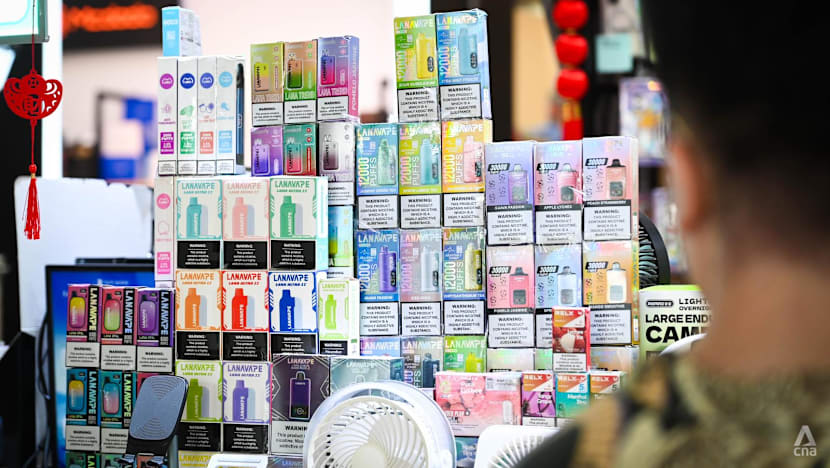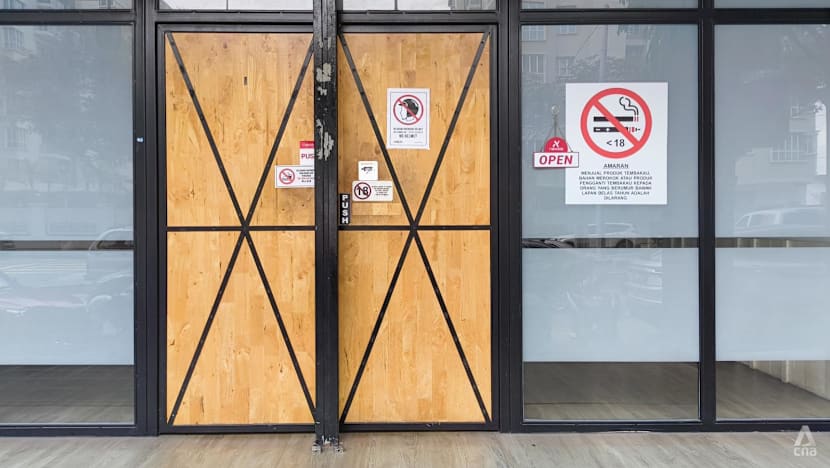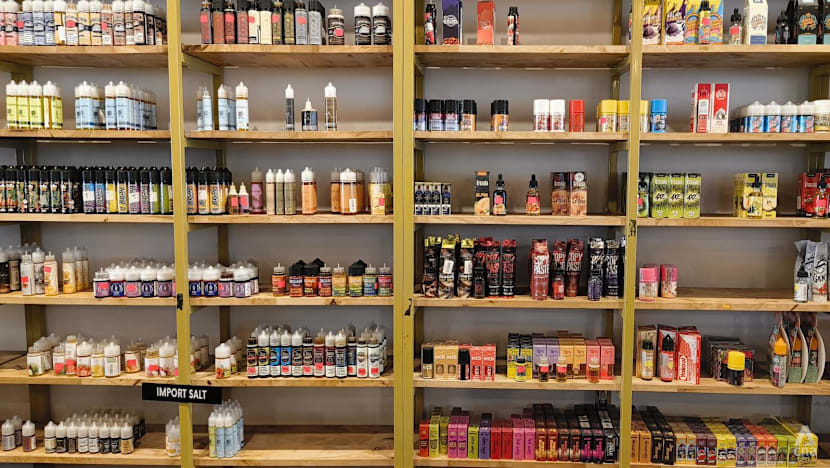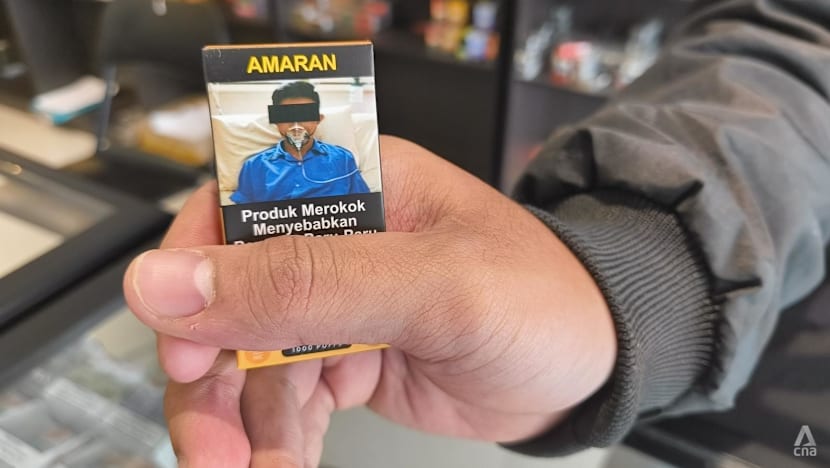What’s at stake for Malaysia as it eyes total ban on vapes by mid-2026?
Experts interviewed by CNA emphasised that the effectiveness of any vaping regulations - be they for a ban or a more controlled market - will hinge entirely on enforcement.

A shop selling vapes in KSL City mall in Johor Bahru. (Photo: CNA)

This audio is generated by an AI tool.
KUALA LUMPUR: Behind the heavily tinted glass of an unmarked storefront in Kuala Lumpur, a colourful secret is concealed.
Inside, vape e-liquids in multi-coloured boxes and sleek e-vaporiser devices are neatly arranged on shelves - a stark contrast to the dull, non-descript facade outside.
Business may be brisk for now, but a looming ban on vape sales and usage in Malaysia could eventually force the shop that resembles a hipster cafe to shut down.
Health Minister Dzulkefly Ahmad said on Thursday (Sep 25) that Malaysia plans to implement a nationwide ban on the sale and use of vapes by mid-2026, in the most definitive comments yet on the government’s intended action against e-vaporisers.
“The question is no longer if we ban vaping, but when,” he said on the sidelines of an event in Cyberjaya, reiterating that Malaysia will be taking a “phased approach” towards a vape ban.
He said that the final timeline would depend on the Cabinet’s approval of the matter but that the ministry will continue to push for a ban by mid-2026.
This appears to be a U-turn from February, when Dzulkefly said that regulating rather than banning such products outright would allow authorities to better control the vaping and smoking ecosystem in the country.
But in recent months, the government’s stance against vaping appears to have hardened even though industry players claim there were mixed signals, including how the health ministry was still allegedly accepting registrations for vape products.
And while those in the industry are unsurprisingly against an outright ban on vapes, some public health experts have also argued against a complete ban, citing concerns that it may lead to more underground businesses.
Public health policy expert Sharifa Ezat Wan Puteh of Universiti Kebangsaan Malaysia told CNA that regulations that are already in existence, such as Act 852, can continue but should be enhanced with enforcement to reduce the spread of illicit substances.
Act 852 - or the Control of Smoking Products for Public Health Act 2024 which came into force in October last year - regulates the sale, packaging and labelling of tobacco products and smoking devices in Malaysia, including e-cigarettes and vapes.
It has been implemented in stages, beginning last year with prohibitions on smoking in many public places such as educational institutions, as well as a ban on online and vending machine sales of vapes.
“Banning with little enforcement will just see illicit market growth,” said Sharifa Ezat.
“There should be a combination of harm reduction and an abstinence model approach. While the war on drugs must continue, implementation of licit, taxed vape products must be provided as an option for some users,” she added.
Other experts, however, warn of the health risks of vaping, especially with the rise of drug-laced vapes, and want the authorities to take a tougher approach similar to Singapore's.
CNA has reached out to Malaysia's Health Ministry for comment.
MALAYSIA’S CURRENT SITUATION
Malaysia’s move towards an outright ban on the sale and use of vapes comes amid concerns about the rise of drug-laced vapes.
Meanwhile in Singapore, harsher penalties for vaping offences came into force on Sep 1, with etomidate - the anaesthetic agent that has been found in some vapes - listed as a Class C drug under the Misuse of Drugs Act.
Singapore - like other Southeast Asian countries such as Brunei, Cambodia and Thailand - already bans the use and sale of vapes.
Dzulkefly had said in July that the open-system vapes, for instance, are susceptible to tampering and illicit substances. Such vapes allow users to manually refill the device with any e-liquid or substance, unlike closed systems which use pre-filled pods.
News outlet The Edge reported him as saying in parliament that data showed that roughly 80 per cent of seized vape products contained banned substances such as methamphetamine and cannabinoids.

Observers in Malaysia’s vape industry whom CNA spoke to acknowledge the concerns surrounding the proliferation of drug-laced vapes, and fully support enforcement against those who sell these items.
These drug-laced vapes represent a new method for syndicates to distribute illegal substances to a younger demographic.
Data from the health ministry showed that of the 44,211 secondary school students who were caught smoking in 2024, 17,172 of them had used conventional cigarettes, while 19,782 used e-cigarettes or vapes.
CNA has contacted the ministry for comment on the remaining students.
Mohamad Neezam Talib, who is president of the Malaysian E-Vaporisers and Tobacco Alternative Association, said that drug-laced products gave the vape industry a “bad name”.
For his part, Neezam said that he works with various enforcement agencies and reports the sale of such products when he comes across them. He also actively looks out for them, which he said are easily available on social media platforms.
“This is not our wrongdoing; these are offences by drug distributors. None of the industry players, the legal ones, are involved in this,” said Neezam.
Meanwhile, Malaysian Substance Abuse Council (MASAC) secretary-general Raja Azizan Suhaimi told CNA that drug-laced vapes - known generically as “mushroom” in the local market - were a big and growing problem among many youngsters.
MASAC is a non-governmental organisation that advocates for a shift in perspective on drug abuse, viewing it as a mental illness rather than a crime.
“Something must be done, but I am not sure if banning vapes outright will help solve the issue. At the end of the day, you must go after those selling illegal substances. It is a lucrative business, just like conventional drugs,” said Raja Azizan.
Raja Azizan stressed there was a need for the Malaysian authorities to gazette new substances under the Drugs Act, saying that many urine tests eventually came up negative among those suspected of using drug-laced vapes. This meant that those using the substances could not be sent for rehabilitation, he said.
Neezam, for one, wants the Malaysian government to follow Singapore’s lead in listing etomidate as an illegal drug. Such drug-laced vapes - also known as Kpods in Singapore - have gained ground among the young there.
“Are they waiting for more people to become like zombies before they ban this substance? And all the blame will be on the vape industry,” he said.

CONFLICTING SIGNALS?
In Malaysia, the idea to ban vapes has long been bandied about, but nothing has come to fruition. Dzulkefly in February of this year said that Malaysia might have already missed the boat for a total ban on vapes.
Neezam said suggestions to ban vapes started almost 10 years ago, but that the government finally decided to regulate the industry by enacting Act 852.
He questioned the health minister’s deadline to completely ban the use and sale of vapes by the middle of 2026, reflecting a sense of anxiety among those in the industry.
“We have had the Act for just about a year. Is it logical that an Act that just came into law barely a year ago to regulate vapes would then have to be repealed so quickly. Will they also announce a ban on cigarettes?” he said.
The legislation stops short of a complete ban on vape sales, but introduces stringent regulations governing product content and variety, alongside a nationwide ban on public product display which also applies to cigarettes.
And with the deadline for full enforcement of regulations looming on Oct 1, retailers are in a frantic race to clear their stock of unregistered products before the clock runs out and to comply with current regulations.
Only products that have been registered with the health ministry can be sold, and all new packaging must carry health warnings similar to those currently on cigarette boxes, while the maximum nicotine concentration for products will be reduced.
For instance, to comply with the Act - which strictly prohibits the visibility of these products from the outside - the storefront selling vapes that CNA visited in Kuala Lumpur appears unmarked.
“We are ready although we hoped we had more time to clear our old stock,” the shopkeeper who wanted to be known only as Jimmy told CNA, adding that he does not know what would happen to the unsold stock and that this would depend on the business owner.
While the current regulations present their own business challenges, Jimmy said that a complete ban on vaping - similar to the one heavily enforced in Singapore - would not be a feasible solution.
“It will only make the black market bigger,” he opined.
Separately, Neezam questioned why the health ministry was still accepting the registration of vape products if it wanted to ban them completely.
To register vape e-liquids in Malaysia, companies must submit an application to the ministry, which includes a RM5,000 (US$1,200) fee and a laboratory analysis report, among other requirements.
The devices meanwhile require certification from the Standards and Industrial Research Institute of Malaysia - the government body that tests and verifies product compliance before market entry.
“The industry has spent millions on registering their products with the ministry,” said Neezam, adding that the vape industry existed because some people wanted to stop smoking cigarettes.
Ridhwan Rosli, the secretary general for the Malaysian Vape Chamber of Commerce, said that the legal players in the industry have been following the laws, including sending their products for testing but that the ministry has held up the registration of many of these items.
He claimed that pushing the public away from legal products only encouraged the illegal trade of drug-laced vapes, which was much harder to control.
“As they cripple the legal players, they are indirectly assisting the illegal players make more money,” he alleged.
Ridhwan also questioned why Ispire Technology - an American company which manufactures vapes - has been allowed to set up its manufacturing hub in Johor state.
Ispire Technology reportedly began production at its 31,000 sq ft Senai factory in February 2024.
Johor, along with Kelantan, Terengganu, Perlis, Kedah, and Pahang, have banned the sale of vapes via local council restrictions on vape sale licences. These prohibitions only target the sale and not the use of vapes.
“You don’t allow the sale of vapes in the state but yet allow the factory to operate there,” Ridhwan pointed out.
Malaysia’s Health Ministry was reported by The Edge on Jun 4 as saying that the firm was granted an interim manufacturing licence by the Ministry of Investment, Trade and Industry solely for export purposes.
Ispire Technology - which is listed on the NASDAQ stock exchange - said in a press statement on Jun 9 said that its Malaysia subsidiary Ispire Malaysia complies strictly with all applicable Malaysian laws and regulations.
It added that all its manufacturing activities at its Johor facility are “exclusively for export purposes and do not involve the production or distribution of any nicotine- or cannabis-containing liquids or gels within Malaysia and for export”.
When CNA tried visiting the factory on Sep 26, security at the entrance of the industrial complex where several other factories were also located was noticeably tight, with a guard saying that only those with prior appointments would be allowed in.
The factory was not visible from the guardhouse. There were also no signboards at the guardhouse.
CNA has reached out to the company for comment.
Ridhwan further noted that officials from the finance ministry held a recent meeting with vape industry players, informing them about the likelihood of a hike in the tax on vape e-liquids. Currently, the tax on vape e-liquids is 40 sen per millilitre.
“There doesn’t seem to be a clear policy at the moment and the signals between the various ministries are conflicting,” he said.
According to statistics published by the Malaysia Vape Industry Advocacy in 2023, the retail value of the vape market in the country was estimated at nearly RM3.5 billion.

COMPLETE BAN STILL WANTED
At the same time, there are many parties who still want a total ban on vape and support Dzulkefly’s plan.
The Galen Centre for Health and Social Policy, an independent public policy research and advocacy organisation, is one of those which has commended the government for its decision.
“This phased approach beginning with open-system vapourisers which are easily modified, misused and spiked with adulterated vape e-liquids and mixed with drugs such as etomidate, is the right thing to do. We have to be firm and pragmatic,” its chief executive Azrul Mohd Khalib said in a statement on Sep 11.
He said that for too long, Malaysia has been out of step with surrounding countries which have banned vapes and e-cigarettes.
The Singapore government for example has said it takes a “zero-tolerance stance” on vaping to “pre-emptively stop these new harmful and addictive products from entering the market” and prevent them from becoming entrenched the same way as traditional cigarettes.
It said that a study by the Health Sciences Authority on commonly found e-vaporisers in Singapore last year found that the nicotine consumed from one e-vaporiser can be equivalent to about three to four cigarette packs.
Anti-tobacco activist NV Subbarow told CNA that the growing drug menace, especially among school students, necessitates an immediate ban of vapes.
“We can’t wait anymore. I hope they don’t make another U-turn and give all kinds of excuses anymore. I’m not sure if it’s political pressure or (if) it is about business, but this is a serious issue.
“But there is no point banning vape if the enforcement is lacking,” he said, pointing to news reports on how vapes, for example, are easily available in Johor despite a supposed ban on its sales in the state.
Subbarow added that there was a need to look at Singapore, where authorities have doubled down on enforcement against vapes, including at its immigration entrance points.

Pulmonologist Nurul Yaqeen told CNA that while some may believe that vaping is less harmful than smoking cigarettes, users risk developing lung diseases, adding that she is seeing a clear and worrying increase in vaping-related respiratory issues, particularly among younger patients.
“Cigarette smoking's dangers took decades to become fully clear. We simply do not yet know the long-term consequences - in 20 to 30 years’ time - of vaping on lung cancer or Chronic Obstructive Pulmonary Disease risk.
Nurul said that a well-enforced total ban on the sale of vaping products would be the clearest and strongest signal to denormalise the behaviour and remove easy access to such products.
She, however, said that for the small subset of adult smokers who have quit and switched to vaping, a ban could force them into a difficult position.
“They might relapse to traditional cigarettes, which we know are more harmful. This is a serious concern that policymakers must address. Therefore, any policy discussion around a ban must be coupled with robust, accessible, and evidence-based smoking cessation support,” she said.
For Faiz Rosli, a 42-year-old businessman in Kuala Lumpur, the debate over vaping is deeply personal.
Two years ago, he turned to vaping to escape a long-standing cigarette addiction, a decision he believes has led to an improvement in his health.
“I don’t want to think about a ban for now. But I might go back to cigarettes if I can’t purchase vape in the future,” he said.
But restaurant owner Afiq Muhamad, 39, told CNA that he backs an outright ban of vapes, believing that it is even worse than cigarettes as it is more addictive.
He had stopped smoking back in 2016 when his first son was born. He used vapes as a replacement but it grew to become an addiction.
“I used vape to stop smoking but then got dependent on it. Vaping is much easier to hide because there is no smell and smoke compared to cigarettes,” said Afiq, who is from Bachok, Kelantan and has stopped vaping for several months now.
He admitted that the quitting process has not been easy, detailing withdrawal effects such as having a heavy feeling in his chest. When he sees friends or others vaping, the urge for "just another puff" is intense.
"Fighting the urge is the biggest battle for me," he said.
“But it is better to face the pain of quitting now than the lasting pain of never having quit. The best thing is to just not start it in the first place,” he added.






















